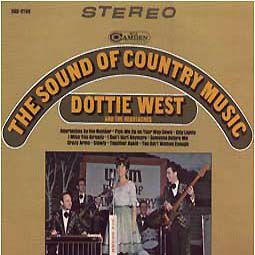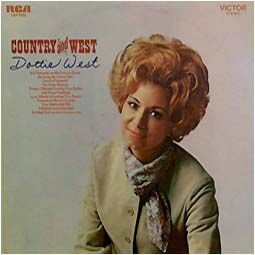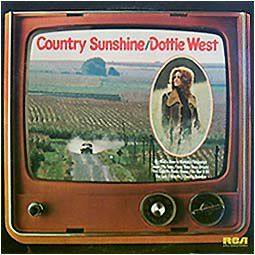


DOTTIE WEST
Born Dorothy Marie
Walsh outside McMinnville, TN, on October 11, 1932, she was the oldest of ten
children. Dottie began appearing on local radio and went on to study music
at Tennessee Tech where she also sang in a band; the group's steel guitar player,
Bill West, became her first husband in 1953. In 1959, she and Bill
auditioned for Starday's Don Pierce and were immediately offered a contract.
Although the resulting singles West cut for the label proved unsuccessful, she
nonethless moved to Nashville in 1961. There, she and her husband fell in with a
group of aspiring songwriters like Willie Nelson, Roger Miller, Hank Cochran,
and Harlan Howard; they also became close friends with Patsy Cline and her
husband Charlie Dick.
West earned her first Top 40 hit in 1963 with "Let Me Off at the Corner,"
followed a year later by the Top Ten "Love Is No Excuse," a duet with Jim Reeves
(who had scored a major success with her "Is This Me?"). Also in 1964, she
auditioned for producer Chet Atkins who agreed to produce her composition "Here
Comes My Baby"; the single made West the first female country artist to win a
Grammy Award, leading to an invitation to join the Grand Ole Opry. In Atkins,
West found the perfect producer for her plaintive vocals and heart-wrenching
songs; after releasing the Here Comes My Baby LP in 1965, they reunited for the
following year's Suffer Time, which generated her biggest hit yet in "Would You
Hold It Against Me". After the 1968 LP Country Girl, West teamed with Don Gibson
for a record of duets, 1969's Dottie and Don, featuring the number two hit
"Rings of Gold." The album was her last with Atkins, and she followed it with
two 1970 releases, Forever Yours and Country Boy and Country Girl, a collection
of pairings with Jimmy Dean.
Suddenly, West's
image underwent a huge metamorphosis; the woman who once performed dressed in
conservative gingham dresses and refused to record Kris Kristofferson's "Help Me
Make It Through the Night" because it was "too sexy" began appearing in
skin-tight stage attire. As the sexual revolution peaked, so did West's career;
after the 1973 success of the crossover smash "Country Sunshine," written for
Coca-Cola, her material became far more provocative and, much to the chagrin of
country purists, more commericially successful as well.
In 1977, she was recording the song "Every Time Two Fools Collide" when,
according to legend, Kenny Rogers suddenly entered the studio and began singing
along. Released as a duet, the single hit number one, West's first; the duo's
1979 "All I Ever Need Is You" and 1981 "What Are We Doin' in Love" topped the
charts as well, and a 1979 duets album titled Classics also proved successful.
As a solo artist, West notched a pair of number ones in 1980 — "A Lesson in
Leavin'" and "Are You Happy Baby?".
As the 1980s progressed, West's popularity began to slip; although she remained
a popular touring act, West's financial problems mounted, and in 1990, after
divorcing Winters, she declared bankruptcy, culminating in the foreclosure of
her Nashville mansion. After a car accident and a public auction of her
possessions, she began making plans for a comeback, including an album of duets
and autobiography. But en route to a September 4, 1991, appearance at Opryland,
the car she was riding in flipped, and a few days later West died of her
injuries.


